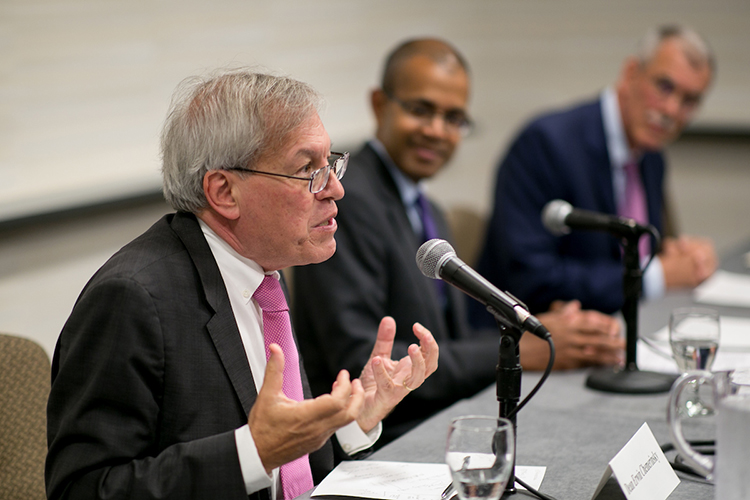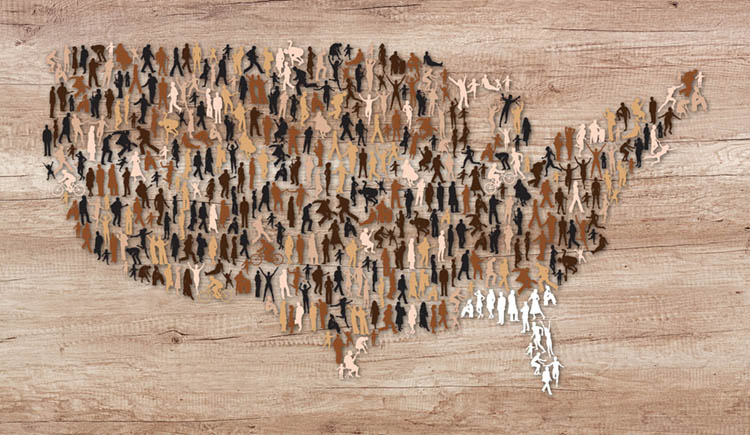This year's Supreme Court blockbusters were politically charged: 'We're in a more partisan time'

Erwin Chemerinsky, dean of the University of California at Berkeley School of Law. Photo © Kathy Anderson
During an era of increasing partisanship, the U.S. Supreme Court took on a series of blockbuster cases its last term that were largely divided along ideological lines—likely a sign of things to come, a panel of legal scholars and lawyers said.
Among those blockbusters, the most politically charged case raised fundamental questions about presidential authority and power. In Trump v. Hawaii, the court in a 5-4 decision upheld President Donald Trump’s modified ban on travel to the U.S. from five predominantly Muslim countries plus North Korea and Venezuela.
“This one was supercharged,” Donald B. Verrilli Jr., former solicitor general under President Barack Obama and a partner with Munger, Tolles & Olson, said Friday during “Blockbuster Supreme Court Decisions in a Partisan Era.” The panel was sponsored by the ABA Judicial Division.
Verrilli pointed out that the ban considered by the court was its third iteration. “The first travel ban was basically written by two guys on a napkin who didn’t know anything about the national security issues at stake,” Verrilli said. “It lacked the kind of legitimacy that comes from the normal, significant, intense executive branch interagency process that would normally precede something as complex and consequential as the travel ban.”
It also revealed the motivating force behind it, Verrilli said, which made it politically charged and prompted a stinging dissent from Justice Sonia Sotomayor. In her dissent, Sotomayor cited the president’s statements about Muslims.
“It was certainly appropriate. It was the context of the case,” Erwin Chemerinsky, dean of University of California at Berkeley School of Law, said of Sotomayor’s dissent. “The ultimate issue in the case was, was the travel ban impermissibly motivated by religious animus against Muslims? What she did was simply present all the statements Donald Trump made as a candidate, Donald Trump as president and as a high-level executive expressing animus against Muslims.”
The upcoming confirmation hearings of Brett Kavanaugh to the high court also illustrates the ideological debates over the future of the court. There seemed to be broad agreement that he’s exceptionally qualified. “It seems to me the fight is about his views and how it may affect his decisions,” said moderator Kannon K. Shanmugam, who heads Williams & Connolly’s Supreme Court and Appellate Litigation practice. “Is that where it’s going?
“We’ve been going in this direction a long time,” said Verrilli, who believes the only reason President Obama’s nominee, Merrick Garland, did not get a hearing was “the concern that putting him on the Supreme Court would generate different results than if a Republican president nominated a conservative judge.”
“He was as qualified as you can get,” Verrilli added. “Let’s be honest, that’s the only explanation. I wish that weren’t so. I think it’s been a tragic devolution; I think it’s bad for the reputation of the judiciary and bad for the rule of law.”
And it’s a sign of the times. “I do think we’re in a more partisan time, perhaps, since Reconstruction, and with the country so divided and polarized, it’s not surprising that this will spill over into the confirmation process,” Verrilli added.
“Confirmation fights about the ideology of the nominees have been going on since the beginning of American history,” Chemerinsky said, adding that during the 19th century, 20 percent of nominations were rejected by the Senate largely because of ideology.
“What’s new is that for the first time, the ideology of the justices corresponds to the political party of the president who appointed them.”
Follow along with our full coverage of the 2018 ABA Annual Meeting.



